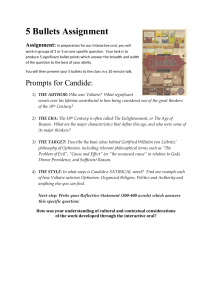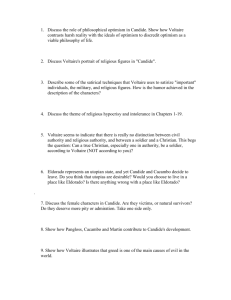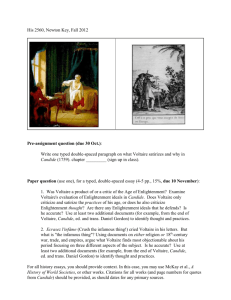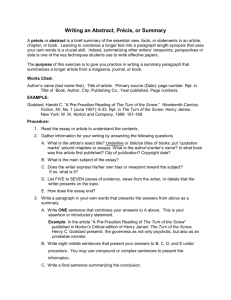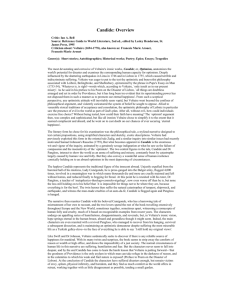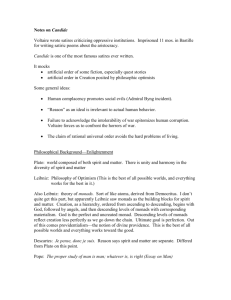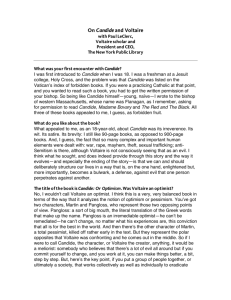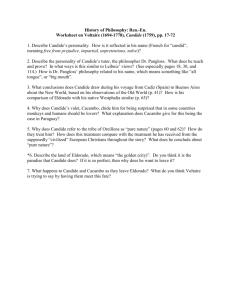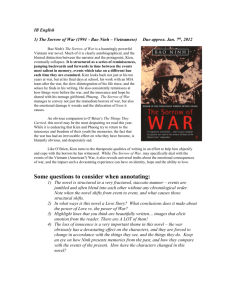Voltaire`s Candide
advertisement
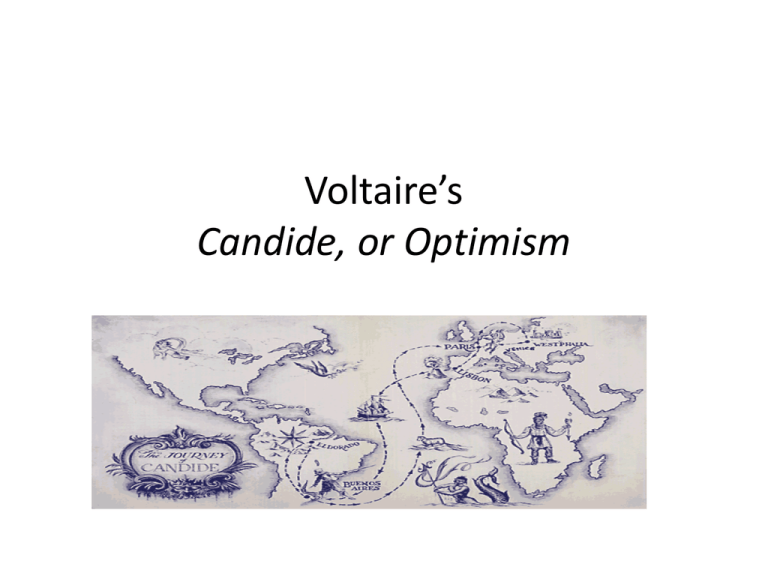
Voltaire’s Candide, or Optimism Chronology and Biography • November 21, 1694 Born Francois-Marie Arouet •1704-11 Educated in Paris at the Jesuit College Louis-le-Grand where he acquired a solid grounding in Latin literature, religious education and a passion for the theatre. • 1713 held a position in the French embassy in Holland • 1716 Returns to Paris and is exiled to Sullysu-Loire for writing a poetic satire against the Regent Philippe duc d’Orléans • 1717-18 Imprisoned in the Bastille for several months, on account of further scurrilities against the Regent. • 1718 Banished for 6 months to Châtenay. Adopts the pseudonym of ‘Voltaire.’ • 1726 – 8 Exiled in England for a spell of forced contemplation following a quarrel with an aristocrat • Presented at court to George I. Meets Alexander Pope and corresponds with Jonathan Swift and admires his Gulliver’s Travels • Return to Paris in October 1728 • 1755 Settles on the outskirts of Geneva. The Jesuit Order is expelled from Paraguay and the Lisbon earthquake happens. • 1756 poem on the Lisbon quake is published • 1758 writes Candide and acquires Château de Ferney and its estate, near Geneva, where he will remain for the rest of his life • 1759 Candide is published and the Jesuit Order is expelled from Portugal • 1778 Visits Paris after 28 years for the production of his last tragedy and died there on May 30th • 1789 Fall of the Bastille Historical Context •Lisbon was destroyed by earthquake on the Catholic All Saint’s Day, November 1, 1755 •The six-minute quake killed 15,000 people, injured at least the same and destroyed 30 churches as well as thousands of houses. • So many pious dying while at church gave rise to superstitious speculation. •1500 Pilgrim homes were destroyed on November 19 • Explanations were offered in religious terms •So outraged was Voltaire at such stupidity, that he responded in verse. • Rousseau responded claiming that humans are at fault for leaving the natural world, committing original sin, and living in cities. •Rousseau embraces Leibnitz in his view that everything must be the best in all possible worlds or one must give into suicidal pessimism. The Optimism of Pangloss • God is perfect; God created the world; a perfect being would create a perfect world, therefore the world is perfect • It is therefore the best of all possible worlds • A perfect being would create everything that could be created, therefore everything that could exist does exist. • Everything is connected to everything else, therefore everything must be for the best The Deism of Voltaire • Believed that God made the universe, but then left it to run on its own • Voltaire thought there were rational grounds for believing that the universe was created and governed by “a necessary eternal supreme intelligent being…” Themes • Human Condition – The grand theme of the novel is the human condition. Candide wonders, what is the best way to approach life? • Religion – Both in the story, and for Voltaire religion is something between a man and God – not something that lends itself to power dynamics, priests, churches, and inquisitions. •Happiness – Whenever it appears, happiness is unmasked (usually by Martin) as a cover for anger, grief, and discontent. •War – The art of war is not a noble art in the novel. Instead, it is a barbaric system governed by its own rules and using its own reason. Style Voltaire used the entire world for the stage of his novel. It allowed him to place ideal societies and backward societies in obscure parts of the world. It further allowed him to exaggerate facts about those places. Another element is his use of the Eden trope. Many writers since the writer of the biblical book Genesis have used the idea of gardens as paradises (or hells) that one finds oneself in and, for some reason, banished from. Candide journeys through a series of such gardens. Each garden has a geographic location and a lesson to be learned. Satire Voltaire chose satire as a way to challenge the cult of optimism that reigned during that time. He is a comic satirist. He simply loved humans too much to be tragic. But because he loved them, he tried to help them as much as possible. Picaresque An episodic, often autobiographical novel about a rogue or picaro (a person of low social status) wandering around and living off his wits. The wandering hero provides the author with the opportunity to connect widely different pieces of plot, since the hero can wander into any situation. Picaresque novels tend to be satiric and filled with petty details. Candide is a picaresque novel. Candide is forced by fate to ramble about the world collecting people and losing them, gaining riches and losing it all. His travels bring him into contact with the workings of the world, but this only makes him more skeptical. Critical Response • The rulers of Geneva expressed their view of Candide by burning it. • The idea that some found it so objectionable was good publicity. •Smugglers made sure that anyone anywhere in Europe could get a copy of the small work on the black market. • Voltaire’s reception? People either fervently loved him, or wanted to burn him.
